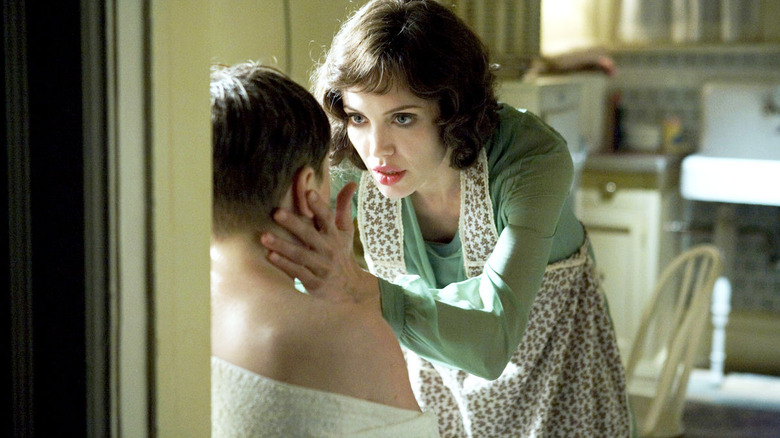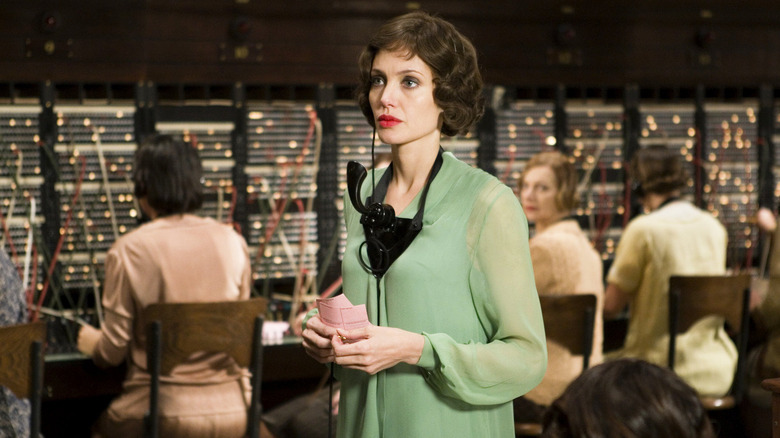Juror #2 Fans Need To Watch This Clint Eastwood-Directed Courtroom Drama With Angelina Jolie
Clint Eastwood's 2008 film "Changeling" is based on the real-life case of Christine Collins. In 1928, Christine Collins' nine-year-old son Walter was abducted from the streets of Los Angeles while he was on the way to the movies. Collins called the police, and the subsequent investigation received a lot of press. Despite the publicity, the LAPD was unable to locate Walter, so the case went cold. Five months later, though, Walter was found in DeKalb, Illinois. He was reunited with Christine, but something was amiss: It wasn't actually Walter. Christine protested, but a police captain named J.J. Jones said that she should take the boy home anyway to "try him out," as he put it. Just to clear up the matter, dental records were taken, proving that the boy wasn't Walter.
To save face, though, Jones declared that Collins had indeed been reunited with her actual son but had experienced a mental breakdown, causing her to lose the ability to recognize him. As such, Collins was committed to a psychiatric facility under a mysterious order called Code 12. It was eventually revealed that "Code 12" was used to unlawfully imprison anyone who was an inconvenience to the LAPD. Later, the boy would confess to being an imposter, having only claimed to be Walter as an excuse to run away to Los Angeles and meet movie stars. Christine was then released and immediately sued the LAPD. She won the case, but was never paid the money she was owed.
In "Changeling," Christine Collins was played by Angelina Jolie, while J.J. Jones was portrayed by Jeffrey Donovan. Eastwood, drawing from a script by J. Michael Straczynski, directed the drama gently, as is his style, depicting the horrors of its story very slowly and matter-of-factly. A great deal of the film's second half takes place in a courtroom (making it a companion piece to Eastwood's 2024 legal drama, "Juror #2") and involves the true depths of the police corruption at hand. In the end, Jolie is the key to keeping "Changeling" on track, carrying all the movie's moral outrage. Otherwise, Eastwood calmly lets the action play out.
Changeling was a 2008 Oscar-bait film
"Changeling" was marketed as an Oscar-bait movie and was indeed nominated for three Academy Awards. Jolie was up for Best Actress, while Tom Stern was nominated for Best Cinematography, and James Murakami and Gary Fettis were up for Best Art Direction. Critics, however, were merely warm towards the film. The acting and photography were widely praised, but many critics felt that the film was too calm and monotonous to be effective. Overall, the movie only has a 62% approval rating on Rotten Tomatoes, based on 206 reviews, and many felt that Eastwood's straightforward, old-timey storytelling ultimately did "Changeling" a disservice. Where, many asked, was the indignation? The sense of pervasive injustice?
The structure was weird, for one. The kidnapping arm of the story took too little screen time, as did the painful portion where Collins was told to live with a nine-year-old stranger, pretending he was her son. Also given short shrift was the fact that Collins was attacked and pilloried by the LAPD. By the time Christine is committed to the psychiatric facility, the movie is only half over. The attention of the film then shifts to the actual location of Walter and the legal dealings Christine has to undergo to attain justice. It feels like "Changeling" would have functioned better as a miniseries, with each chapter of Christine's drama fully explored in an extended episode of its own.
In real life, Walter Collins was the victim of a serial killer, Gordon Stewart Northcott, who abducted and murdered several young boys in the late 1920s. His killings were known as the Wineville Chicken Coop murders. Northcott eventually confessed to killing 10 kids, although there was only enough evidence to convict him for three. He was executed by the state in 1930. In "Changeling," Northcott was played by Jason Butler Harner, and the film climaxes when Northcott claims he wants to confess to Walter's murder. When Christine confronts him, however, he refuses to do so.
The tragic epilogue of Changeling
In real life, Christine Collins did indeed interview Northcott, hoping to find if he actually killed her son. He confessed, then un-confessed, then confessed again, and Christine knew she wouldn't get the truth from him. "Changeling" had a more "Hollywood" version of that conversation, even though it is true that Northcott invited Collins to a personal confession, only to renege at the last minute, moments before he was executed.
In "Changeling," it's filmed like an epilogue, but in real life, there was actually closure to Christine's case. In 1935, five years after Northcott had been hanged, a man stepped forward with some facts about the case. In the movie, the character was named David Clay, although the actual person's name remains hidden. It seems that, as a boy, this "Clay" character had been abducted by Northcott and was held prisoner in a chicken coop with some other boys. He managed to escape, however, and was reunited with his parents. This escaped boy claimed that Walter was among the kids he saw and that he may have also escaped into the desert. These facts don't jibe with other real-life testimonies in the case, which found that Walter was indeed killed, but the movie ends with Christine hoping to find her son again.
There is a closing chyron about how laws were changed after Collins' case to prevent women from being mentally institutionalized just because a cop said they ought to be. At least some good came out of this tragic event. And Jolie, at the very least, got to display her impressive acting chops.


